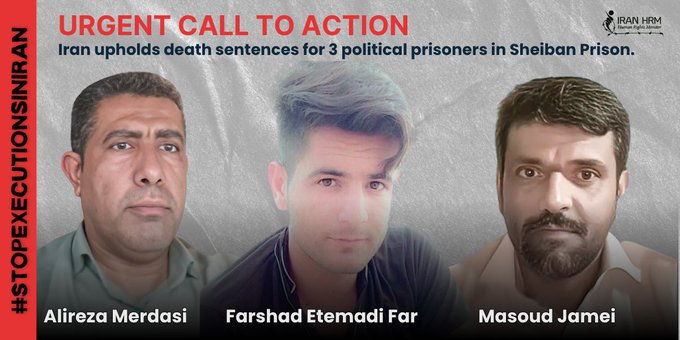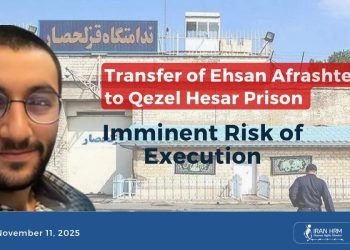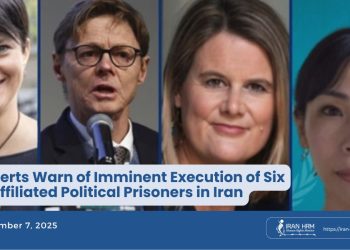The death sentences of three political prisoners—Farshad Etemadifar, Masoud Jamei, and Alireza Mardasi—have been confirmed and officially communicated to them inside Sheiban Prison in Ahvaz. These rulings were issued after prolonged detention, torture, coerced confessions, illness, and denial of a fair trial. Concerns are now rising over the imminent risk of execution.
Introduction
In recent days, multiple reports have confirmed that these three political prisoners have once again been notified of their heavy sentences—two death sentences each—after months of uncertainty. The entire process, from arrest to trial, has been marked by severe violations of basic principles of due process, prompting urgent warnings from families and human rights defenders.
Arrests and Formation of the Case
On 16 June 2023, intelligence agents arrested four young men from Pichab village in Basht—Farshad Etemadifar, Saman Hormatnejad, and Davoud Hormatnejad—and transferred them to the Intelligence Department detention facility in Yasuj. From the earliest hours of detention, all detainees were subjected to prolonged interrogations, severe psychological pressure, and physical torture. None had access to legal counsel and their families remained unaware of their whereabouts for weeks.
In August 2023, Masoud Jamei, an Arab resident of Gheizaniyeh, and Alireza Mardasi, a veteran schoolteacher from Kuy-e Abuzar in Ahvaz, were arrested and added to the same case.
Charges
According to the ruling issued by Branch 1 of the Ahvaz Revolutionary Court, the charges against the three political prisoners include:
- Corruption on earth (Efsad fel-arz)
- Moharebeh
- Supporting and sympathizing with the Mojahedin-e Khalq Organization of Iran
- Propaganda against the state
- Assembly and collusion against national security
Sources close to the families emphasize that no independent evidence has been presented to substantiate these charges, and that most accusations are based on statements extracted under torture.
Issuance of Death Sentences
On 10 July 2025, the Ahvaz Revolutionary Court, presided over by Judge Edibi-Mehr, sentenced each of the three men to two death sentences. Two other defendants—Saman and Davoud Hormatnejad—received prison sentences of 12 and 15 years. The entire process was conducted behind closed doors, with no meaningful opportunity for defense.
Farshad Etemadifar’s Condition
Farshad Etemadifar, born in 1996 and from Pichab village, has been held in harsh conditions for more than 15 months in intelligence detention centers and Sheiban Prison. During this period he developed severe gastrointestinal and respiratory problems but was never granted access to specialized medical care. His family has repeatedly stated that he denies all security-related allegations and that any statements attributed to him were extracted under extreme physical and psychological pressure.
Masoud Jamei; the Most Critical Medical Condition
Masoud Jamei, born in 1977, a father of four and a former oil-field guard, suffers from extremely severe health conditions. He has advanced stomach cancer, as well as liver and kidney dysfunction, internal infection, and high blood pressure. Reports indicate that torture during interrogation and the harsh conditions inside the prison have significantly worsened his condition.
Despite multiple medical warnings, the Ahvaz Prosecutor’s Office and Intelligence Department have refused to authorize his transfer to a hospital. To intensify pressure on him, security forces also arrested his wife, Zeinab Hezbapur, and his three childrenand prosecuted them in the Bavi Revolutionary Court.
Alireza Mardasi; a Respected Teacher Denied Treatment
Alireza Mardasi, a well-known primary school teacher in Ahvaz with 25 years of teaching experience, was arrested in August 2023 and transferred to Ward 5 of Sheiban Prison. He suffers from severe respiratory and allergic conditions, and his relatives have repeatedly appealed for his transfer to medical facilities outside the prison—requests that have been consistently denied. His students and colleagues describe him as a compassionate and dedicated teacher.
Systematic Violations of Due Process and Fundamental Rights
The case of these three political prisoners contains multiple examples of serious human rights violations:
- Denial of access to independent legal counsel
- Torture and coercion during interrogation
- Reliance on forced confessions as the basis for sentencing
- Closed and non-transparent court proceedings
- Denial of adequate medical care
- Threats and detention of relatives to force confessions
The reliance on charges such as “corruption on earth” or sympathizing with the Mojahedin-e Khalq Organization of Iran without independent evidence highlights how security cases in Iran are used as tools to eliminate critics or dissenters.
Risk of Execution and Calls for Immediate Action
With the confirmation and official notification of the death sentences, concerns about imminent execution have sharply increased. Families are urging an immediate halt to the process and calling for an independent review of the case. Human rights defenders consider this case one of the most alarming examples of due process violations in recent months.
Conclusion
The case of Farshad Etemadifar, Masoud Jamei, and Alireza Mardasi has become a symbol of escalating security pressure, denial of fair trial guarantees, and deliberate neglect of the health of political prisoners. Given the critical medical condition of two of the detainees and the unlawful nature of their arrest and prosecution, an immediate halt to the executions and an independent review of the case are essential and urgent.







